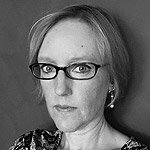 I had what most people would describe as a full-time mother. I believed this, not knowing that other kids had mothers who didn’t get weary of their lives, who didn’t need to box themselves into their bedrooms from time to time. Since I can remember, my mother would sometimes hide for days, wrapping herself in her ivory sheets, sleeping or eating toast with margarine and jam from a small plate my father would bring her. Then,one morning, she’d be in the kitchen when I got up for school, drinking coffee as if nothing had happened, as if she had been pretending, testing us, wanting to see if we’d still be there when she came out.
I had what most people would describe as a full-time mother. I believed this, not knowing that other kids had mothers who didn’t get weary of their lives, who didn’t need to box themselves into their bedrooms from time to time. Since I can remember, my mother would sometimes hide for days, wrapping herself in her ivory sheets, sleeping or eating toast with margarine and jam from a small plate my father would bring her. Then,one morning, she’d be in the kitchen when I got up for school, drinking coffee as if nothing had happened, as if she had been pretending, testing us, wanting to see if we’d still be there when she came out.
 Perhaps this is why my father did so much caretaking when I was small. He toilet-trained me, taught me to tie my shoes, and showed me how to purse my lips so I could whistle. He bathed my little sister Laura and me together, squishing a soaked wash cloth against our backs as we giggled, then wrapping us up in big cotton towels to dry. At some point, Mom told us we were old enough to bathe ourselves, so we did.
Perhaps this is why my father did so much caretaking when I was small. He toilet-trained me, taught me to tie my shoes, and showed me how to purse my lips so I could whistle. He bathed my little sister Laura and me together, squishing a soaked wash cloth against our backs as we giggled, then wrapping us up in big cotton towels to dry. At some point, Mom told us we were old enough to bathe ourselves, so we did.
One Sunday evening when I was eight years old, Laura and I took what was to be our last bath together, acting out tales of survival and rescue on the stormy seas with our suds-covered Barbies. When the water grew cold, we climbed out into the chilly air and grabbed our towels.
While we were drying off, Dad opened the door and walked in.
“Dad!” we cried, holding our towels up to our chins. “You can’t come in here!” Laura said.
“What? I just need to get something.”
Mom yelled from the kitchen. “Mark! You leave those girls alone!”
“Yeah!” we said.
“But I’m the Dad!”
“They’re not little anymore!”
“Yeah!”
Dad stood with his arms folded, as if challenging Mom’s authority, as if he couldn’t be made to move. Laura called his bluff.
“I’ll show you mine if you show me yours!”
I giggled.
“I’m an adult. I don’t have to show anybody anything.”
Mom walked into the bathroom, and Dad turned to her. “Did you hear her? Where did she learn that?”
Mom glared at him. “Where do you think?” A moment passed. Suddenly, Mom’s eyes grew bright, sort of like Laura’s did when she was making up a funny story, but narrower, with more purpose. “Since we’re all here. Mark, come here.”
Dad followed Mom into the hall. They spoke in low tones while Laura and I stood with our towels circled around us. Then, Mom’s singsong voice:
“Girls, come with us.”
Dad, Laura, and I trailed Mom like ducklings into the guest bedroom at the end of the hall. When we were inside, she shut the door.
“Sit,” Mom said. Laura and I perched on the edge of the twin bed. Dad looked at us through the lenses of his military-issue glasses—a remnant of his draftee days in the Army—with a smile pasted on his face.
Mom put her hands on her hips. “Now pay attention.”
Dad looked down. Then he unbuckled his belt.
 I froze. My towel had dropped to my lap and I was afraid that if I pulled it up, I’d disturb the air that had suddenly thickened and walled itself around me. The only time Dad had ever unbuckled his belt in front of me was to smack me with it, and he hadn’t done that for a couple of years.
I froze. My towel had dropped to my lap and I was afraid that if I pulled it up, I’d disturb the air that had suddenly thickened and walled itself around me. The only time Dad had ever unbuckled his belt in front of me was to smack me with it, and he hadn’t done that for a couple of years.
Were we in trouble? They didn’t seem mad. I was afraid Dad was going to pull down his pants, and I flashed back to the couple of times I had seen my brother or my male cousins naked when they were using the bathroom and we were too small to care. But that was little kid stuff. We were too big for that now.
All of this slid through my mind in the second before Dad unzipped his faded, stained jeans, the ones he wore to paint walls and work on the car. His light blue boxer shorts peered through the “V” of his open zipper. I thought he must be bluffing, trying to teach Laura a lesson about being a smart aleck with her “you show me yours” comment. He’d buckle back up and it would all be one big joke, and I’d probably feel stupid for being so freaked out.
Dad gripped the side of his jeans and—for a moment—he hesitated, just that quick beat where I think he wondered if he really wanted to do what he was doing. My throat tightened. I wanted to grab my towel and run, but I held myself still.
Then, in one quick, smooth motion, Dad pulled his jeans and boxers down to his knees.
Prickles of static spread through my face. My sight narrowed into a tunnel that led straight to Dad’s exposed crotch. I felt both light-headed and hyper aware, like when I was afraid my teacher was going to call on me in class and I didn’t know the answer.
“Get up in there,” he said. I glanced at his face; his smile was gone. He used his sharp I’m teaching you something voice.
Laura and I scooted forward until our faces were inches from his genitals.
“This is the penis,” Dad said, cupping it in his right hand and holding it up a little.
“You see it?”
We nodded. He didn’t look like my brother or cousin. His penis was thick, big, kind of wrinkly and soft. It was gross. I was worried it was going to touch my face. The thought made my stomach burn.
He dropped his penis and pulled forward his right testicle. “These are called testes,” he said, showing us the other one. “See that?”
Testes. Since that moment, I’ve always remembered that word. Test-ees, like being tested on something, like math or spelling.
“Make sure you get a good look.” We looked.
Someone knocked on the door. “What are you guys doing?” My brother, Jake.
Mom used her singsong voice again. “You can’t come in unless you take off your clothes!”
“What?”
She smiled. “No, it’s okay, come in.” Jake opened the door just as Dad pulled up his jeans.
“We’re teaching something to the girls,” Mom said. “We’re done.”
Dad zipped and buckled his jeans. Laura and I sat naked on the bed, our damp towels growing cold in our laps. I played it as cool as I could, trying to look older, sitting straight with my hands crossed on top of my towel. I felt I had been initiated into something; that it was time to be mature and act like I could take it all in stride. I tried to smile like Mom did. I tried to steady my breath and look normal, ignoring my skipping heartbeat.
Mom pointed at us. “Girls. You can’t tell anybody about this. Anybody. This is a private, family thing. You can’t tell any of your friends. Other people won’t understand. You hear me?” We nodded.
“Speak up,” Dad said.
I said yes, I heard her. Laura said yes.
Thirty years later, I was walking down a Boston street to an appointment with my psychoanalyst, when an image flashed in my mind: my dad, frozen in that moment just before he pulled everything down, his hands grasping the waist of his jeans, that plastic smile on his face. My breath thickened and stuck in my throat just the way it had that day. I thought my therapist might think this was important, so I went to my appointment and I told.

Interview with Amy Grier
As I read this beautifully written and amazing account about a family secret, I can’t help reflecting how hard it is to put pen to such things. Can you talk a little about how you got this done? I don’t necessarily mean just in terms of emotion. I’m thinking about writing techniques…
That’s the key: finding the emotional entry that leads into language. I have to sit down and take a moment to get into that little girl’s world, see again through her eyes, what it was like to feel confused and afraid nearly all of the time, but still believing that my parents could only be good and right. It’s tough, and it isn’t fast, but it’s the only way that works for me.
I had wanted to write this piece for years, but couldn’t find a way in. Once I started writing my current project—a book-length memoir—I realized that my most powerful work came from writing scenes that felt most frightening, or even shameful. Whatever I was avoiding was exactly what I needed to write.
After I understood this, I literally woke up one morning with a strong need to write about this incident. I ate breakfast, walked to a coffee shop, and wrote the draft in one go. It felt fantastic. Putting this secret down into writing, claiming the narrative as my own, was incredibly liberating.
Isn’t it surprising how families keep secrets? Is it a subject–I mean, the way keeping secrets sometimes seems so vital to families–that you’d thought about before doing this piece?
It wasn’t until I began writing my memoir that I understood how many secrets there were in my family, going back at least to my grandparents’ families—alcoholism, abuse, incest, mental illness—and most of this during the years when these issues were so stigmatized, so shameful, that no one talked about them.
I’m not surprised families keep secrets, because it’s based on a false belief that the secrets will preserve the family. Often it’s not even a conscious decision; it comes from a deep fear that the family will disintegrate if the secret is not kept. Frequently, it’s that the guardian of the secret believes that her own façade of goodness or competence will crumble and result in abandonment.
There’s another reason that’s important to consider and makes it very complicated, and that’s when the victim of abuse, sexual assault, or incest decides to keep the incident a secret for his own safety or the safety of others. Sometimes the perpetrator is alive and believed to be a wonderful person, and exposing him not only feels terrifyingly unsafe, but it might also destroy his family. Sometimes the victim doesn’t want to be responsible for that. I still believe the perp should be exposed for the criminal he is, but when he’s a relative, this is really tough to do. We have to respect the victim’s decision either way.
I’m wondering if this is but one of a series of memoirs. If it is, can you say where you think it locates itself? That is, at the beginning or nearer the end of your transit?
Yes, you called it. It’s part of a book-length memoir I’m writing about growing up with a mother who has Borderline Personality Disorder, and this story is about a quarter or a third of the way through.
My mother is a textbook case of BPD: clinical narcissism, intense fear of abandonment, extreme and frequent mood swings, periods of depression when she spends days in her bedroom, and dissociative episodes in which she just stares into space, oblivious to anyone’s presence.
She believes, however—and I think this is how she subconsciously tries to keep herself safe, with this secret—that she is perfectly fine, and her pain is my fault. She thinks I am the one who’s sick. I haven’t spoken to my parents in twelve years for this reason. It’s impossible for me to stay emotionally healthy while visiting a mother who believes I’m responsible for her suffering.
The good news is that if I hadn’t disconnected from them, I would never have been able to write about my childhood. I would have felt too guilty. I never would have exposed my own secrets!
We all tend to talk about how we worry (some only a little, of course, some a lot!) about how other family members feel about our writing about them. Has this been a factor for you?
Absolutely. For me, this concern is integral to being an ethical memoirist, even though these are my stories and I’m claiming the right to tell them. I am most concerned about my siblings, but they both know what I’m writing, and nothing that involves them will be published without them knowing. In the shorter pieces I’m submitting right now, I’m changing everyone’s name except mine.
What’s really tough for me is that there are secrets that involve my siblings that I’m not currently at liberty to tell. I really, really, want to expose these secrets. But since I’m not the main character in those incidents, I don’t feel that I have the right to claim them without my siblings’ permission.
Can you talk a little about what seems to you the most important element of this remembrance?
Even after writing this and discussing it with my sister, I was surprised when a workshop colleague referred to it as sexual abuse. I was resistant to this; I felt it wasn’t serious enough to earn that label.
But then I read other writers’ pieces about what I felt was clearly sexual abuse, but they couldn’t accept that label, either. That’s when I understood why so many of us keep these things secret or play them down. We are so culturally conditioned to believe that sexual abuse must be a specific kind of extreme experience that involves rape or near-rape. We don’t realize that the resulting emotional trauma is about the shattered boundary and broken trust, not necessarily the specifics of the abuse.
This is when I began to fight for the label, not only for myself—this event was very traumatic for me—but for others who felt they didn’t warrant the kind of serious consideration and compassion that abuse deserves. We all deserve compassion for childhood suffering, and we must first give that to ourselves. We have to believe unwaveringly in our own stories and our right to claim our own narrative.
A final word about secrets: secrets destroy families. They destroyed mine. Even if no one learns the secret, you can’t prevent the emotional consequences, especially in the generation you’re raising.
 Those who keep secrets are altered in thinking and behavior. This skews the emotional life of the next generation. They grow up wondering what’s wrong with them, why their sense of reality seems so off.
Those who keep secrets are altered in thinking and behavior. This skews the emotional life of the next generation. They grow up wondering what’s wrong with them, why their sense of reality seems so off.
We’re fortunate to live in an era where the stigma of suffering abuse is much less than in the past. This is a good thing, and we, as storytellers, should take advantage of it and clear out our closets. It’s terrifying. But then you do it and it’s as if an anvil has been lifted from your heart.
Follow us!Share this post with your friends.

